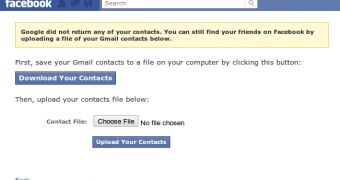Facebook has now retaliated to Google's move to block contact imports from the social network. Facebook now offers its users a direct link to the Google contact export tool and then enables users to simply upload the file.
While it still involves a few more steps than the automated process offered before, it should be relatively easy for users to get access to their Google contacts list over to Facebook.
When Facebook users try to get their Gmail data, they'll be greeted by the same dialog as before. However, during the authentication process, which will inevitably fail, users will be redirected to a new page. Why would Facebook still have users go through this even though it knows the authentication will fail for its users, is a mystery.
On the new landing page, users will see this message: "Google did not return any of your contacts. You can still find your friends on Facebook by uploading a file of your Gmail contacts below."
The page offers a direct link to the CSV file containing Gmail contacts data. Users have to save the file on their desktops and then upload it to Facebook, which they can do from the same page. Facebook then takes care of the rest.
Last week Google made a small but crucial change to its API terms of service, only services which also offer a way for users to export their contacts are now allowed to use the automated API.
Facebook, notoriously, doesn't allow its users to retrieve contacts data. Google's move was aimed squarely at Facebook, though it is unlikely that it actually expected Facebook to change its ways.
The reason why Facebook can still have access to the data, even with the block, is that, unlike the social network, Google provides its users with means of getting their data out. Google can't block Facebook from using the link without possibly affecting other services.
It remains to be seen if Google will make another move or will just leave it be. Still, other than possibly making more people aware of the situation, Google shouldn't have too many expectations. At this point Facebook is too big to be intimidated and most people don't really care if they can get their data back or not. [via TechCrunch]

 14 DAY TRIAL //
14 DAY TRIAL //